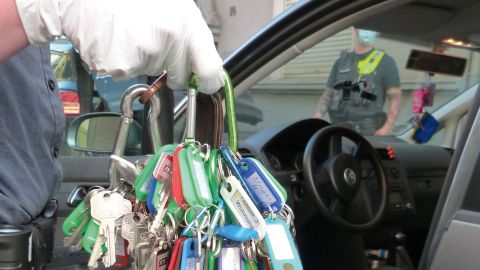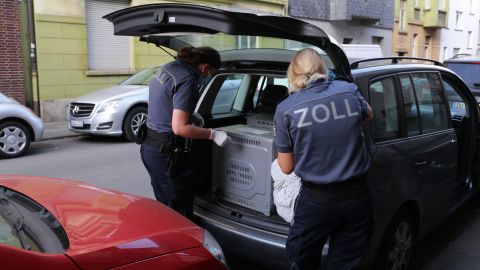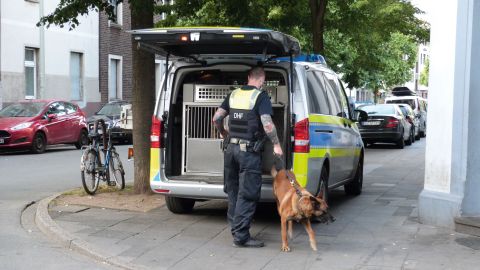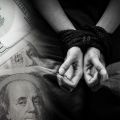Duisburg, 6.30 a.m., Hochfeld district. The woman wanted on a warrant is not there. "On a short vacation in the Harz Mountains," says her husband, who opens the door with a young son in his arms. Old building. First floor, cluttered with furniture and odds and ends. Everything looks gloomy. Police and customs investigators show the search warrant. The suspicion: the woman is part of a human trafficking ring and is responsible for housing the illegal workers. The police have moved in to put an end to the business. Men and women living crammed together somewhere in the city. Exploitation. Slavery. Forced labor. Here in Germany? In our midst?
Humans as commodities seems to be a lucrative business since more and more refugees have been coming to Germany to find a better life here. In 2019, members of the Nigerian mafia were exposed for intimidating girls with voodoo spells and selling them to suitors. However, trafficking has long since ceased to be limited to women in the red light district. The term "human trafficking" also covers children who are forced into marriage, people with disabilities who are harassed by organized begging gangs and young people who are sent on thieving sprees. Hardly anyone can grasp the suffering that often lies behind this. Nor the unscrupulousness with which international trafficking organizations torture and degrade people.
The investigators in Duisburg have had the gang in their sights for a long time. They are said to work with people smugglers who bring people from Eastern Europe to the Ruhr region. The scam: they collect 350 euros a month in rent in return for a stained mattress in a 50-square-meter hole with a toilet. "As an average of twelve residents share one accommodation, that's 4,200 euros a month," calculates criminal director Jürgen Dekker, who is in charge of the operation. His team also includes Gringo, a Belgian shepherd dog. The team needs his nose. After all, he is one of eight certified banknote sniffer dogs in the country and can smell money.
And so he sniffs his way through the hallway, living room, kitchen and bedroom. No results. Hardly any cash. The investigators work their way through the business documents. Then a hit: they find dozens of keys in the three cars parked in front of the house. They belong to the flats where the victims live: around 150 men and women from Ukraine, Georgia and the Republic of Moldova who were smuggled into the country with forged Romanian and Bulgarian documents. Speechless, helpless and dependent on their traffickers, who hold them like slaves. They have to hand over every cent they earn as unskilled workers.
"It's like a transfer of power. People are put under pressure and have to bring in money. The masterminds keep their hands in the background and decide on life and limb," says Chief Inspector Wilfried Neumann (56). He creates the "human trafficking" situation report at the LKA and was previously in Duisburg for 19 years. Focus: organized crime.
"Poverty is the best breeding ground for becoming a victim of human trafficking," he says and explains how the scam works: "The first step is to lure victims with beautiful pictures on the internet. Then there is the pressure of the family's expectations and the promises of the traffickers." The dream of beauty and wealth lures girls from Nigeria in particular. They take out loans of up to 60,000 euros from traffickers to take them across the Mediterranean in a rubber dinghy. In Europe, they hope to look after the children of rich families. In reality, they are abused, robbed and sometimes raped on their journey through the Sahara desert. Then they end up in dingy back rooms to work off their debts as sex slaves - weeks, months, years - until they are no longer worth anything and consider themselves worthless.
No cell phone. No passport. No money. Neumann: "They are isolated, beaten and intimidated." In 2018, a case before the Duisburg district court caused a stir: The accused was a couple who had cast voodoo spells on the women. After the ceremony, the women believed that their bodies belonged to the traffickers. And if they disagreed, they also threatened: "If you don't do what we say, a family member will die."
Investigators estimate that thousands of young Nigerian women are smuggled to Germany every year. Only 94 cases were recorded by the criminal investigation department in North Rhine-Westphalia in 2020. "The pimps are becoming more and more skillful and arrange hotel rooms online. Investigations then become more complex," says Neumann.
Sometimes, however, they do succeed: back to Duisburg-Hochfeld, to the human traffickers from Chechnya and the Republic of Moldova. They placed the illegal workers with forged passports with logistics companies and beverage bottlers. The "slaves" had to hand over at least 10 euros out of an hourly wage of 15 euros. Crime boss Dekker: "The companies are often not to blame. The money is made by the intermediary criminals."
Success of the "Sprudel" investigation: arrest warrants are executed against five of the nine suspects aged between 31 and 51. The charges: human trafficking, withholding and embezzlement of wages, social security violations, forgery of documents, money laundering.
The authorities estimate the damage in lost taxes and social security contributions at 4 million euros. Not to mention the suffering of the victims.



